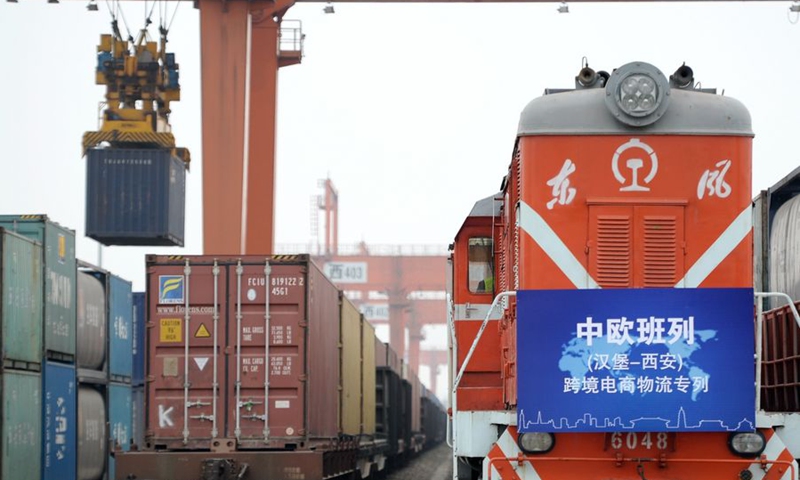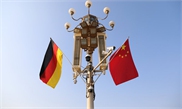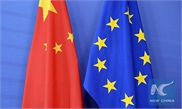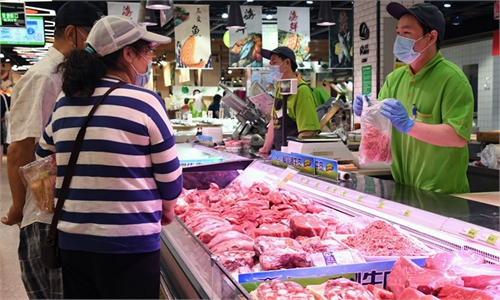
A cross-border e-commerce freight train from Hamburg of Germany arriving in Xi'an, northwest China's Shaanxi Province. (Xinhua/Li Yibo)
Not long ago, a China-Europe freight train carrying 35 containers - more than 300 tons of masks and protective suits - set off from Wuhan, Central China's Hubei Province to Duisburg, Germany.
It was the second special train carrying coronavirus prevention supplies from Wuhan to Europe following the COVID-19 outbreak. Against the backdrop of widespread disruption and suspensions in Eurasia, and the impact of the pandemic on the global economy and supply chain, the China-Europe freight trains are bucking the trend. In May, the numbers of trains and shipments increased 43 percent and 48 percent respectively, compared with the same period last year, both setting new records and showing the trains are a veritable "road of life" between Asia and Europe.
The China-Germany train service is the most fruitful project under the Belt and Road framework jointly launched by Germany and China. The trains not only carry materials needed for virus prevention, but also extend their traditional friendship and mutual support.
China and Germany are all-round strategic partners. Since the outbreak, leaders of the two countries have maintained close strategic communication and cooperation, and the governments, businesses and social groups of the two countries have actively donated to each other to help contain COVID-19.
China's government also facilitates official German procurement in China. In addition to the trains, tons of virus prevention supplies are transported to Germany by air nearly every day. Medical and health experts from the two countries have exchanged experience on many occasions and conducted practical cooperation in the field of drug and vaccine research and development. People from the two countries have spontaneously supported each other in various ways, and many touching stories of mutual assistance have emerged.
The pandemic is a crisis, but it also offers new opportunities. The "road of life" across Eurasia can be a "road of opportunity" to deepen mutually beneficial cooperation between China and Europe. There is much to be achieved in the Belt and Road cooperation between China and Germany.
Germany is an important partner in implementing the Belt and Road Initiative.
The concept of the Silk Road was first proposed by German scholars. Respected German Chancellor Angela Merkel is one of the first European leaders to support the Belt and Road Initiative (BRI). Germany is a founding member of the Asian Infrastructure Investment Bank (AIIB) and the largest non-regional investor. Duisburg and Hamburg have become two important hubs for China-Europe freight shipments in Europe. The number of trains between Duisburg and different parts of China each week has increased from more than 30 before the pandemic to about 50 now, marking a new high.
The BRI follows the trend of history. The pandemic once again shows that mankind shares weal and woe. Only by working together and living in harmony can we live happily in our common home.
When protectionism and unilateralism are picking up amid an environment of bullying behavior, the joint construction of the BRI is helpful in promoting trade and investment liberalization. It also supports the World Health Organization (WHO) in playing a leading and coordinating role in the international response to the public health crisis.
The Belt and Road jointly built by China and Germany meets practical needs. As the world's major trading countries, both China and Germany face the tasks of coordinating virus prevention and control, and back up economic and social development.
China-Europe freight trains - efficient, environmentally friendly, reliable and risk-free - have during the pandemic become a major channel for cargo transportation and anti-virus supplies between China and Germany. China and Germany also took the lead in opening "fast lanes" for personnel exchanges between China and Europe, creating favorable conditions for the two countries to facilitate economic reopening.
Both sides should take this as an opportunity to consolidate joint prevention and control of the virus between Asia and Europe to reduce the risks of the virus spreading and to accelerate economic and trade cooperation and personnel exchanges. Both sides should unblock regional economic cycles and synergize the Belt and Road strategy with EU and Eurasian connectivity.
There is huge potential for China-Germany cooperation on the BRI. The pandemic has not changed the fundamentals and prospects of the high-quality development of China's economy.
At present, China's overall industrial resumption rate is close to 100 percent, and its manufacturing purchasing managers' index has been above the line of expansion for three consecutive months.
This year's work report from the Chinese government emphasizes the goals and tasks of ensuring employment and people's livelihoods, as well as ensuring market entities. At the same time, China will continue to open up and expand market access.
The strong resilience of the Chinese economy and its huge market potential will continue to be the driving force for Belt and Road cooperation.
During the recent High-level Video Conference on Belt and Road International Cooperation, all parties agreed to strengthen international cooperation against COVID-19, carry out economic exchanges and policy coordination for the resumption of work and production, and promoted high-quality cooperation on the BRI. The Digital Silk Road and the Health Silk Road will also open up broader space for China-Germany cooperation.
As a Chinese saying goes, "Friends are neighbors even if they are thousands of miles apart," meaning China is ready to work with Germany and other countries to develop new opportunities amid crisis. It is ready to break new ground in these changing times so as to inject positive energy into the battle against the pandemic as well as into global economic recovery.

Chinese Ambassador to Germany Wu Ken Photo: Courtesy of the Chinese Embassy in Germany
The author is Chinese ambassador to Germany



